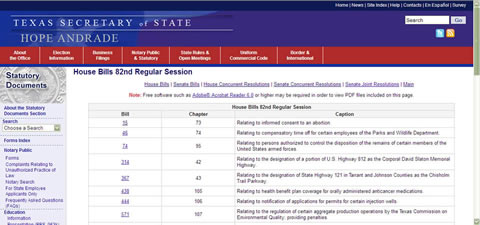Legislative Wrap-Ups
Sep 14
http://window.state.tx.us/taxinfo/taxpubs/tx96_237_3_11.pdf
Texas Public Employees Association
Sep 14
|
82nd R.S.
|
1
|
The constitutional amendment authorizing the legislature to provide for an exemption from ad valorem taxation of all or part of the market value of the residence homestead of the surviving spouse of a 100 percent or totally disabled veteran.
|
|
|
|
82nd R.S.
|
2
|
The constitutional amendment providing for the issuance of additional general obligation bonds by the Texas Water Development Board in an amount not to exceed $6 billion at any time outstanding.
|
|
|
|
82nd R.S.
|
3
|
The constitutional amendment providing for the issuance of general obligation bonds of the State of Texas to finance educational loans to students.
|
|
|
|
82nd R.S.
|
4
|
The constitutional amendment authorizing the legislature to permit a county to issue bonds or notes to finance the development or redevelopment of an unproductive, underdeveloped, or blighted area and to pledge for repayment of the bonds or notes increases in ad valorem taxes imposed by the county on property in the area. The amendment does not provide authority for increasing ad valorem tax rates.
|
|
|
|
82nd R.S.
|
5
|
The constitutional amendment authorizing the legislature to allow cities or counties to enter into interlocal contracts with other cities or counties without the imposition of a tax or the provision of a sinking fund.
|
|
|
|
82nd R.S.
|
6
|
The constitutional amendment clarifying references to the permanent school fund, allowing the General Land Office to distribute revenue from permanent school fund land or other properties to the available school fund to provide additional funding for public education, and providing for an increase in the market value of the permanent school fund for the purpose of allowing increased distributions from the available school fund.
|
|
|
|
82nd R.S.
|
7
|
The constitutional amendment authorizing the legislature to permit conservation and reclamation districts in El Paso County to issue bonds supported by ad valorem taxes to fund the development and maintenance of parks and recreational facilities.
|
|
|
|
82nd R.S.
|
8
|
The constitutional amendment providing for the appraisal for ad valorem tax purposes of open-space land devoted to water-stewardship purposes on the basis of its productive capacity.
|
|
|
|
82nd R.S.
|
9
|
The constitutional amendment authorizing the governor to grant a pardon to a person who successfully completes a term of deferred adjudication community supervision.
|
|
|
|
82nd R.S.
|
10
|
The constitutional amendment to change the length of the unexpired term that causes the automatic resignation of certain elected county or district officeholders if they become candidates for another office.
|
Following each legislative session, people ask us where they can view signed copies of bills and how to find session law chapter numbers for bills that became law.
The information requested in both of these questions can be found on the Secretary of State's website. As bills that passed the Legislature are signed by the Governor, copies are filed with the Secretary of State's office, where they are scanned and made available online on the Bills and Resolutions page. Bills are listed by type and bill number range. Some bills are filed without the Governor's signature, and links to view these bills are included in the list. You can determine whether a bill that passed the Legislature was signed or filed without the Governor's signature by looking up the bill in the Texas Legislature Online. If the bill passed but was not signed, you will see the action "Filed without the Governor's signature."
The same page that contains links to signed copies also lists the session law chapter numbers that were assigned to each bill. The session laws constitute a complete set of all bills passed into law during a particular legislative session. Chapter numbers are used primarily for citing a bill in a legislative history annotation. The Library's bill-chapter cross reference table, which allows you to search chapter numbers and their corresponding bill numbers back to the 19th Legislature, will be updated with 82nd R.S. bills once all chapter numbers have been assigned.

May 30
The beginning of 2011 will bring some new laws, including an increase in the minimum coverage requirements for auto insurance, as legislation passed during the 80th and 81st legislative sessions goes into effect.